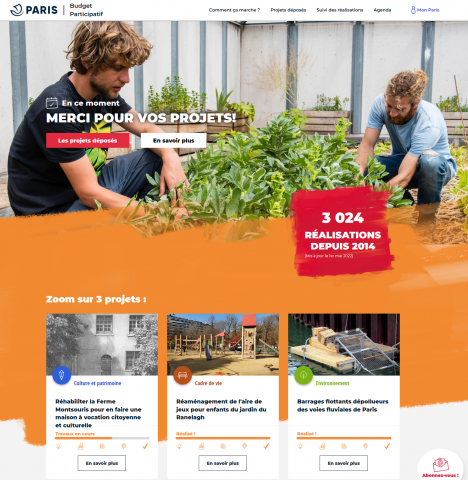CitéLibre Participatory Budget - Paris
Paris (France)
Since 2015, the City of Paris has been devoting 5% of its annual investment budget to citizens' projects to enable them to improve their daily lives in their city. The Participatory Budget Tool has been set up to facilitate the whole process for the administration and the citizens, encouraging their participation. The participatory process is structured as follows:
- The phase of submitting ideas by citizens through a form allowing them to describe their project and inputs for improving the city;
- The construction phase, which allows city administrators to validate the ideas (in line with the city's areas of competence and feasibility) and to define the operational directions that will be invested in and the budget needed to carry out the projects;
- The voting phase, which allows all citizens to vote through a majority judgement system;
- The project monitoring phase, which allows the winning projects to have an editorial page where all the project progress t is published and kept up to date until the project is completed.
During the voting period, citizens are invited to vote online, but the city provides a system to include people without digital facilities to vote physically through ballot boxes available throughout the city and a team of digital facilitators, ensuring inclusion and access to the service to all cohorts.
The Participatory Budget Tool allows the complete definition of these phases, to set up workflows to process each idea submission, which will go through the four phases described above.
To ensure the participation of the largest number of people, we have implemented well established methods to ensure the accessibility and usability of the application by relying on an expert UX and UI team that also has a panel of users who submit their feedback to continuously improve the tool.
The Participatory Budget Tool is a service that empowers citizens. It allows citizens and policy makers to exchange new ideas for improving life in a community. The policy makers thus rely on a bottom-up approach.
Collectively, each identified technical department qualifies the feasibility of projects and evaluates its own budget needed for implementation. This process is entirely digital and therefore frees civil servants from unnecessarily complex procedures.
For its initial development, which lasted for three months, the development team was able to reuse the bricks and functionalities already available in the global Lutece offer and to concentrate only on the developments related to the administration of the campaign phases and the voting system, building this service vertically on the underlying infrastructure.
The tool has allowed an original voting system that would have been extremely complex to implement otherwise. The Participatory Budget Tool is mainly made of open source software bricks developed on the Lutece base, allowing the citizens to consult the algorithms and thus to notice in all transparency the neutrality of the tool, which is essential for a citizen service.
Some tools developed with Lutece have been in place for 20 years. The development team constantly relies on users' feedback in order to maintain the functionalities and to adapt the usability according to the projects and their target audience.
